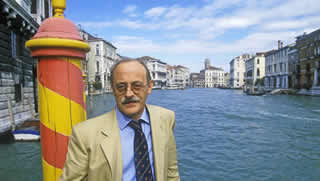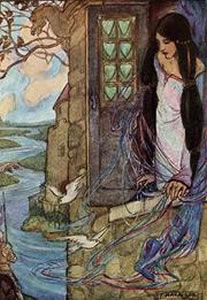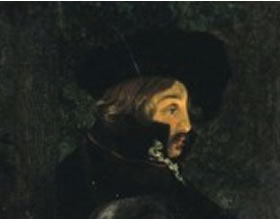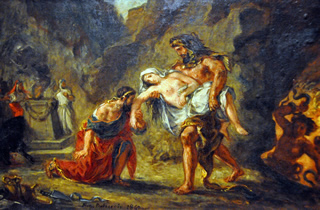|
De Italiaanse schrijver, vertaler, en literatuurwetenschapper Antonio Tabucchi werd op 23 september 1943 geboren in Pisa. Zie ook mijn blog van 23 september 2010 en eveneens alle tags voor Antonio Tabucchi op dit blog.xml:namespace prefix = o ns = "urn:schemas-microsoft-com:office:office" />
Uit: The Missing Head (Vertaald door Patrick Creagh)
Manolo the Gypsy opened his eyes, peered at the dim light creeping through the cracks in his hovel, and got to his feet trying not to make a sound. He had no need to dress because he slept fully clothed, and the orange jacket given him the year before by Agostinho da Silva, known as Franz the German, tamer of toothless lions in the Wonder Circus, now served him for both day and night. In the faint glimmer of dawn he groped around for the battered sandals-cum-slippers that were his only footwear. He found them and slid his feet in. He knew every inch of the hut, and could move about in its murk knowing perfectly well where its few wretched sticks of furniture were. He took a confident step towards the door, and in so doing his right foot clashed against an oil-lamp standing on the floor.
Damn the woman! exclaimed Manolo between his teeth. He was of course referring to his wife, who the previous evening had insisted on leaving this lamp beside her bed on the pretext that the blackness of night gave her nightmares and she dreamt of her dead. If she kept the flame burning as low as can be, she said, the ghosts of her dead dared not to haunt her, and so she could sleep in peace.
And what is El Rey about at this hour of the morning, O afflicted spirit of our Andalusian dead?
His wifes voice was muffled and drowsy, as it is with anyone still half asleep. She always spoke to him in geringonça, a hotch-potch of Romany, Portuguese and Andalusian. And she called him El Reythe King.
King of a heap of shit, Manolo felt the urge to answer, but he said nothing. King of a shitheap. To be sure he had once been El Rey, when the gypsies were honoured, when his people freely roamed the plains of Andalusia, when they made copper trinkets to sell in the villages and dressed in black and wore fine felt hats, and their knives were not weapons to fight for your life with, but peerless treasures fashioned in chased silver.

Antonio Tabucchi (Pisa, 23 september 1943)
De Engelse dichteres en schrijfster Mary Elizabeth Coleridge werd geboren in Londen op 23 september 1861. Zie ook mijn blog van 23 september 2010 en eveneens alle tags voor Mary Colderidge op dit blog.
He came unto His own, and His own received Him not
As Christ the Lord was passing by,
He came, one night, to a cottage door.
He came, a poor man, to the poor;
He had no bed whereon to lie.
He asked in vain for a crust of bread,
Standing there in the frozen blast.
The door was locked and bolted fast.
Only a beggar! the poor man said.
Christ the Lord went further on,
Until He came to a palace gate.
There a king was keeping his state,
In every window the candles shone.
The king beheld Him out in the cold.
He left his guests in the banquet-hall.
He bade his servants tend them all.
I wait on a Guest I know of old.
Tis only a beggar-man! they said.
Yes, he said; it is Christ the Lord.
He spoke to Him a kindly word,
He gave Him wine and he gave Him bread.
Now Christ is Lord of Heaven and Hell,
And all the words of Christ are true.
He touched the cottage, and it grew;
He touched the palace, and it fell.
The poor man is become a king.
Never was man so sad as he.
Sorrow and Sin on the throne make three,
He has no joy in mortal thing.
But the sun streams in at the cottage door
That stands where once the palace stood.
And the workman, toiling to earn his food,
Was never a king before.

Mary Coleridge (23 september 1861 25 augustus 1907)
Illustratie door Eleanor Vere Boyle in Voices from Fairyland, the fantastical poems of Mary Coleridge Charlotte Mew and Sylvia Townsend Warner.
De Duitse dichter en schrijver Theodor Körner werd geboren op 23 september 1791 in Dresden. Zie ook mijn blog van 23 september 2010 en eveneens alle tags voor Theodor Körner op dit blog.
Die drei Sterne
Es blinken drei freundliche Sterne
Ins Dunkel des Lebens herein;
Die Sterne, die funkeln so traulich,
Sie heißen: Lied, Liebe und Wein.
Es lebt in der Stimme des Liedes
Ein treues, mitfühlendes Herz;
Im Liede verjüngt sich die Freude,
Im Liede verweht sich der Schmerz.
Der Wein ist der Stimme des Liedes
Zum freudigen Wunder gesellt
Und malt sich mit glühenden Strahlen
Zum ewigen Frühling der Welt.
Doch schimmert mit freudigem Winken
Der dritte Stern erst herein,
Dann klingts in der Seele wie Lieder,
Dann glüht es im Herzen wie Wein.
Drum blickt denn, ihr herzigen Sterne,
In unsre Brust auch herein!
Es begleite durch Leben und Sterben
Uns Lied und Liebe und Wein!
Und Wein und Lieder und Liebe,
Sie schmücken die festliche Nacht!
Drum leb, wer das Küssen und Lieben
Und Trinken und Singen erdacht!

Theodor Körner (23 september 1791 - 26 augustus 1813)
Körner, detail van het schilderij Vorposten van Georg Friedrich Kersting 1815
De Griekse schrijver Euripides werd geboren in 480 of 484 voor Christus. Zie ook mijn blog van 23 september 2010 en eveneens alle tags voor Euripises op dit blog.
Uit: Alcestis
Apollo
Huis van Admetus, waarin ik mij schik aan tafel,
geduldig als een dagloner, ik die een god ben.
Want Zeus heeft door mijn zoon te dooden daaraan schuld,
Asclepius: Zeus dreef de bliksems in zijn borst.
Vertorend om zijn lot doodde ik de smeden van
Zeus' vuur: ik doodde de Cyclopen, daarom dwong
mijn vader mij tot arbeid voor een sterveling, als boete.
Gekomen in dit land, weidde ik voor mijn gastheer
de runderen en hield zijn huis tot nu in stand.
Want ik, die zelf ook vroom ben, vond gelijke vroomheid
in Pheres' zoon, dien ik beschermde tegen sterven.
De Moiren overtroefde ik: zij stonden toe:
Admetus mocht voor 't oogenblik de Hades mijden,
als hij een and're doode in zijn plaats liet gaan.
En al zijn vrienden ging hij lang, hij vroeg hen en
zijn vader en zijn oude moeder, die hem baarde,
en hij vond niemand, die voor hem wel sterven wilde
en nooit het licht meer zien, vond niemand dan zijn vrouw.
Nu steunen in 't paleis zijn armen haar, nu zij
daar worstelt met den dood: want dezen dag, staat vast,
moet zij den dood ingaan en 't leven achterlaten.
En ik, om niet besmet te worden in 't paleis,
verlaat het dak van deze woning, die ik lief kreeg.
Reeds zie ik hoe de Dood nabij gekomen is,
hij, priester der gestorvenen, naar Hades' huis
zal hij haar voeren: juist op tijd is hij gekomen,
loerende op den dag, waarop zij sterven moest.
Vertaald door J. C. Kamerbeek

Euripides (484 v. Chr 406 v. Chr)
Hercules en Alcestis door Eugène Delacroix, 1862
Zie voor nog meer schrijvers van de 23e september ook mijn vorige blog van vandaag.
|



